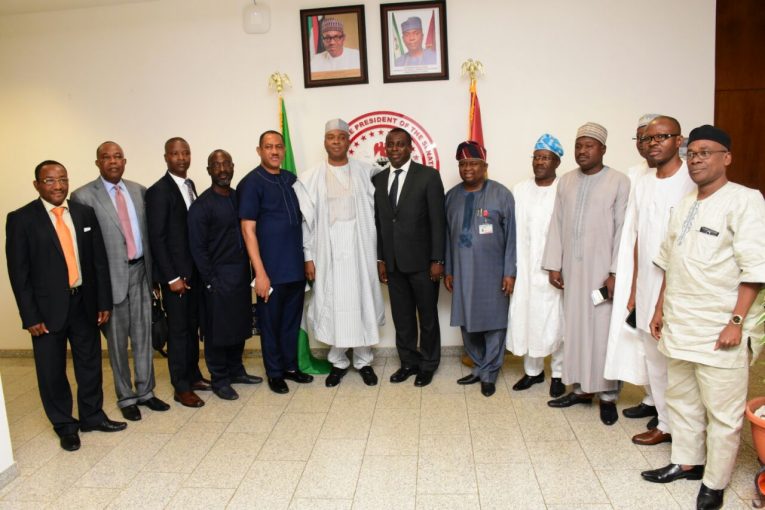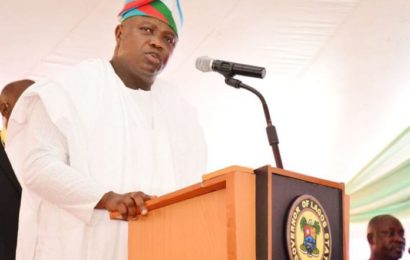
If the bill proposing a 9% tax of communication services is passed into law in Nigeria over 20 million internet users in the country risk being cut off the Internet.
The experts under the aegis of Association of Telecommunication Companies of Nigeria (ATCON) made this known while explaining that there are more implications to the nations Information Communication Technology (ICT) if the proposed Communication Service Tax Bill (CST) is passed into law
The experts presented a case on the proposed tax bill during their visit to the senate president’s office in Abuja recently and also noted that the nation’s survival depend on providing more citizens with Internet access stating that the new tax will only end up excluding more people from the cyberspace.
“The projections are that a new tax on ICT services as high as 9% that is being proposed would result in excluding 10% of the population and that is about 20 million Nigerians from gaining access. And you should know that the survival of our economy cannot be distance from attracting more citizens to embrace internet and therefore ICT services. It does not add up if whatever we do end up not bringing more people into access,” Mr. Olusola Teniola, National President of ATCON said this when he led ATCON delegates on a courtesy visit to Senate President Bukola Saraki, recently.
Teniola reckons that mobile telecommunication is the key driver of Internet access, as such; high cost of data subscription will slow down Internet adoption and use.

“The reality of Internet access in Nigeria is that it’s all about mobile. Only about 13% of Nigerians get broadband access via mobile while less than 1% does from fixed services. One of the main reasons the rate of Internet adoption and use is rather slow in Nigeria is the high cost of data subscription”, according to the telecoms group.
The ATCON President says that “a 500MB plan costs typically 5.4% of average monthly income. The current definition of affordability used by the UN Broadband Commission is where the price of a broadband plan is less than 5% of average monthly income. If we are to use this definition Nigeria is on the cusp of affordability.”
The ATCON President further said that “in Nigeria the average income in 2014 was $2970 (GNI per capita, source: World Bank), 40% of the population actually earned less than half that amount. In practice this means that a 500MB mobile Internet plan priced at 5.4% of average monthly income actually costs the majority of Nigerians anywhere between 7-18% of monthly income.”
According to him, increasing the tax rate on telecoms services will make it difficult to achieve the national broadband target of 30% penetration by 2018, the target which he believes that Nigeria is only some way off.
“In 2013, we planned to achieve 30% broadband penetration by 2018. Current access figure is clearly some way off this target and needs measures to boost growth in usage. A sharp rise in tax as being proposed in the CST will achieve the exact opposite of our desire,” he adds.
“The truth, Sir is that there is severe over taxation in our industry. It explains the slow penetration of services into unserved areas of the country. The truth again sir is that contrary to popular belief telecommunication operators and service providers are barely sustaining existence in these times”, Teniola tells the Federal lawmakers.
Suggesting a reform strategy to the Senate President, the ATCON chief believes that, “there are reasons to suggest that the desire to widen the tax net is laudable and that as things stand telecommunications is about one of the few areas where the net-capture may be widened, we therefore suggest that an increase in VAT tax which is already included in all services of telecommunications by an increase that is not beyond 1% should be a good reform strategy.”
Teniola however expressed the determination of ATCON to support the government’s effort in strengthening the economy and sustaining the telecom industry, which also include reforms in taxation.
“Our mandate is to support the Federal Government to succeed in attracting and protecting investments in the telecommunications industry and to make meaningful input to all aspects of economic development including legislation and management of our industry so it continues to be the oil of growth and development.
“The ongoing work on the proposed 9% Communication Service Tax Bill (CST) is a trending subject. We would be happy to support Government to make the best of our tax efforts which certainly are key components of strengthening the economy and sustaining our industry. Contrary to uninformed opinions we do not object to reforms in taxation neither do we regard taxes as burden,” he said.
ATCON also says there is severe pressure at these times and Government revenue cannot be different. “We however pray that the template with which the telecoms industry is viewed and assessed be slightly modified.”
The ATCON President calls on the lawmakers to reconsider the CST Bill noting that as an alternative, a tax reform that increases the current VAT by a new 1% should be added for the purpose of development of communications. He also recommended that as another alternative, the tax being proposed in the Bill should be limited to 0.2%.
While responding to the ATCON President, Senate President Bukola Saraki assured the association that the senate would only make laws that would get the economy going.
Saraki said the telecoms sector is critical to Nigeria’s economy, and as a result of that, the Senate would never make laws that would push the sector to negative performance.
For Saraki, the lawmakers would rather make laws that would increase the performance of the sector so that the sector generates more revenue and employment for Nigeria.
While urging ATCON to take the issue of corporate social responsibility more seriously, he says that it is only organised private sector like ATCON that can get Nigeria out of recession, as such the Senate would not make laws that affect its negatively.
The Senate President promises ATCON that the Senate would continue to legislate laws that would attract more investment to the sector, and also vowed to remove any hindrance that might want to slow the growth of telecoms industry in Nigeria.








